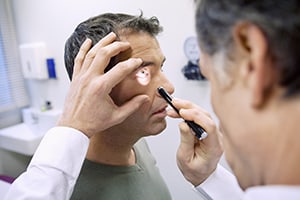Cornea
 The cornea is the clear layer on the surface of the eye that helps protect it. It also helps to focus light as it passes through the eye to the retina. If the cornea becomes damaged, it can potentially affect your quality of vision. Dr. Tory Prestera is experienced in treating a wide range of corneal conditions and diseases. To learn about some common conditions, please review the information below. If you have noticed any of the symptoms noted, please contact us to schedule an appointment with one of our eye doctors.
The cornea is the clear layer on the surface of the eye that helps protect it. It also helps to focus light as it passes through the eye to the retina. If the cornea becomes damaged, it can potentially affect your quality of vision. Dr. Tory Prestera is experienced in treating a wide range of corneal conditions and diseases. To learn about some common conditions, please review the information below. If you have noticed any of the symptoms noted, please contact us to schedule an appointment with one of our eye doctors.
Pterygium Surgery
A pterygium is an abnormal fleshy growth that can develop along the surface of the eye, affecting your vision and causing irritation. As it spreads, it can distort the cornea, causing astigmatism or even block the vision. With proper treatment, pterygia can be successfully removed to restore vision.
Pinguecula Excision
Similar to a pterygium, a pinguecula is a growth that occurs on the surface of the eye. It is most often caused by a deposit of calcium, fat, or protein. A pinguecula typically occurs on the inside corner of the eye, closest to the nose, and looks like a yellowish patch or bump. A pinguecula does not extend from the white of the eye to the cornea like a pterygium, but the pinguecula can sometimes lead to the development of a pterygium. Dr. Prestera is skilled at pinguecula extraction, which can usually be achieved with prescribed eye drops or ointments, but may require surgical intervention in certain cases.
Dry Eye
If your eyes are constantly dry, red, and irritated, you may be suffering from Dry Eye Syndrome. This condition can be caused by a variety of things, such as environmental factors, contact lens use, or the natural aging process. However, it can also be caused by a lack of lubrication in the eye. We offer a variety of treatment options that can help alleviate Dry Eye Syndrome.
Eye Infections
 In addition to the conditions listed above, Dr. Prestera and Dr. Guan are skilled at treating a wide variety of other types of eye infections. If you are experiencing changes in your vision, irritation, pain, redness, or other irregularities, please contact us as soon as possible to schedule an appointment.
In addition to the conditions listed above, Dr. Prestera and Dr. Guan are skilled at treating a wide variety of other types of eye infections. If you are experiencing changes in your vision, irritation, pain, redness, or other irregularities, please contact us as soon as possible to schedule an appointment.
Contact Prestera Eye Medical Group
For more information about corneal conditions or to schedule an appointment with Dr. Prestera or Dr. Guan, please contact us today.